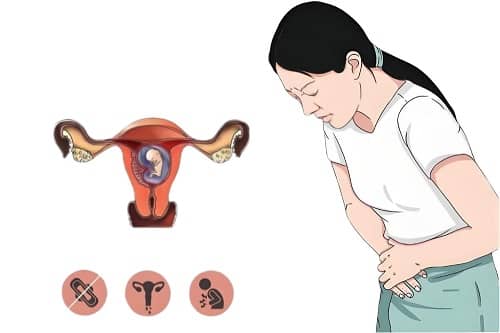Recurrent miscarriage refers to the occurrence of two or more consecutive pregnancy losses before the 28th week of gestation. While this condition is rare, its impact on a woman’s physical and emotional well-being can be profound.

Table of Contents
- 1. Symptoms of Recurrent Miscarriage
- 2. Causes of Recurrent Miscarriage
- 3. How to Diagnose Recurrent Miscarriage
- 4. Treatment for Recurrent Miscarriage
- 5. Prevention of Recurrent Miscarriage
1. Symptoms of Recurrent Miscarriage
- Repeated Vaginal Bleeding: Common in early pregnancy, often with or without clots.
- Recurrent Abdominal Pain: Persistent discomfort or pain in the lower abdomen or lower back.
- Fetal Development Stagnation: Abnormal or halted fetal development detected via ultrasound.
- Tissue Expulsion: The passage of fetal membranes or tissue during miscarriage.
2. Causes of Recurrent Miscarriage
- Anatomical Factors: Uterine abnormalities (such as a septate uterus or bicornuate uterus) can affect embryo implantation.
- Endocrine Factors: Conditions such as luteal phase defects or thyroid dysfunction may lead to miscarriage.
- Immune Factors: Abnormal immune responses may result in the rejection of the embryo.
- Infections: Infections like toxoplasmosis or cytomegalovirus can affect placental function.
- Lifestyle and Environmental Factors: Smoking, alcohol use, or exposure to harmful chemicals can increase miscarriage risk.
- Genetic Factors: Chromosomal abnormalities in the embryo are a common cause.
3. How to Diagnose Recurrent Miscarriage
Diagnosing recurrent miscarriage involves a comprehensive approach:
- Medical History: Collection of information regarding previous miscarriages and pregnancy history.
- Imaging Tests: Ultrasound to assess the uterus and embryo development.
- Endocrine Tests: Monitoring hormone levels, including progesterone and thyroid function.
- Immunological Tests: Screening for immune abnormalities, such as antiphospholipid antibodies.
- Genetic Testing: Chromosomal analysis for both partners to identify any genetic causes.
4. Treatment for Recurrent Miscarriage
Treatment depends on the underlying cause:
- Anatomical Factors: Surgery, such as hysteroscopic correction, may be needed for uterine abnormalities.
- Endocrine Treatment: Supplementing progesterone or correcting thyroid dysfunction can improve pregnancy conditions.
- Immunotherapy: Immunosuppressive treatment to address immune system-related issues.
- Infection Treatment: If infections are identified, antibiotics or antiviral medications are prescribed.
- Genetic Screening: Preimplantation genetic diagnosis (PGD) to select healthy embryos for IVF.
- Psychological Support: Counseling to help manage emotional stress and anxiety associated with multiple miscarriages.
5. Prevention of Recurrent Miscarriage
Preventive measures can significantly reduce the risk of recurrent miscarriage:
- Preconception Check-ups: Comprehensive health evaluations before pregnancy to detect potential risks.
- Healthy Lifestyle: Avoid smoking and alcohol, maintain a balanced diet, and engage in regular exercise to minimize environmental exposures.
- Regular Monitoring: Regular prenatal checkups to monitor hormone levels and ensure overall health during pregnancy.
- Professional Counseling: Genetic counseling and psychological support can prepare women physically and emotionally for a healthy pregnancy.
With scientific treatment and preventive measures, most women experiencing recurrent miscarriage can successfully conceive and carry a healthy baby to term.